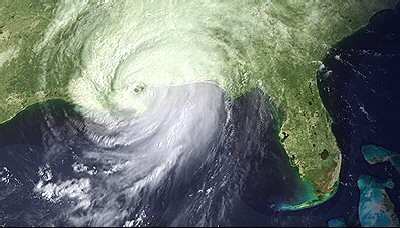This Is Only Temporary
By NATA President James Coyne
 Hurricane Katrina has totally
transformed the political agenda in Washington and these unforeseen
winds will provide both opportunities and challenges for pilots and
aircraft operators across the nation. Every American, hopefully,
will find a way to help those who are suffering from this terrible
catastrophe, whether it's through a cash donation or by pitching in
with more direct material assistance. Public and private aviation
resources have already been called upon for unprecedented relief
efforts (Wisconsin Aviation's Jeff Baum was among the first to fly
supplies into the region) and much more will be required in the
days and weeks ahead.
Hurricane Katrina has totally
transformed the political agenda in Washington and these unforeseen
winds will provide both opportunities and challenges for pilots and
aircraft operators across the nation. Every American, hopefully,
will find a way to help those who are suffering from this terrible
catastrophe, whether it's through a cash donation or by pitching in
with more direct material assistance. Public and private aviation
resources have already been called upon for unprecedented relief
efforts (Wisconsin Aviation's Jeff Baum was among the first to fly
supplies into the region) and much more will be required in the
days and weeks ahead.
Perhaps the greatest need at airports in the stricken region is
for relief crews to give those who have worked around the clock for
the past week some rest. I spoke on Friday with Beth Haskins, CEO
of Signature, who described the incredible challenge of keeping
their New Orleans facility on line in the days immediately after
Katrina struck. Their operations manager, Steve Summers, worked
single-handedly for three days fueling emergency aircraft in the
midst of a city in chaos. Finally, on Friday, a relief manager was
flown in and he was airlifted to Texas for some well-deserved
R&R.

I also spoke with DOT Secretary Norman Mineta and offered to
assist with their emergency transportation requirements. Over the
weekend, FEMA and DHS command center personnel asked us to help
find large charter aircraft to move evacuees out of New Orleans. At
this point, however, we are told that further emergency transport
needs are being adequately fulfilled, although I suspect that
private air charter into and out of the devastated coastal areas
will continue at unprecedented levels for weeks. In addition,
scores of airports throughout the region are in use as staging
areas for Red Cross, FEMA, and utility company supplies and
equipment.
There's been a lot of hand-wringing about how or even if the
Gulf Coast communities devastated by Katrina will ever recover, but
my experience with America's response to crises like this suggests
a much more sanguine outcome. Don't be surprised to read next month
about how remarkable the recovery has been. American generosity,
not to mention our ingenuity and know-how, will rebuild needed
infrastructure and bring billions of dollars of relief to our
fellow citizens. Also, free market capitalism quickly attracts
ambitious problem solvers to any problem, and Katrina is no
exception.
One consequence of this horrible catastrophe is already
benefiting from the nimble dynamics of our free market economy: The
nation's economic response to the sudden shortage of fuels and
other commodities dependent on the Port of New Orleans and the
surrounding industrial corridor. For a few days it was feared that
closed pipelines and shut in refineries would lead to a gasoline
crisis like we faced after the Arab oil embargo of the seventies.
But this time the marketplace, aided by timely releases of crude
oil from the Strategic Petroleum Reserve, has responded with a
textbook example of supply and demand forces reacting to restore
equilibrium.
 But as we all learned in Economics
101, the new equilibrium point in the supply and demand for
petroleum is one with a higher price and somewhat less consumption,
and the ramifications of this new reality, no matter how long it
persists, will be especially profound for our industry – and
are likely to resonate in the halls of Congress, as well. Many
factors beside the impact of Katrina have affected fuel prices over
the past year, from war and political tensions in the Middle East
to the robust economic activity around the world, especially in the
Far East. Some of the pressure on prices comes from speculators,
but most of it is based on the law of supply and demand in a world
where there is little slack in the global system of producing,
refining, and distributing petroleum products.
But as we all learned in Economics
101, the new equilibrium point in the supply and demand for
petroleum is one with a higher price and somewhat less consumption,
and the ramifications of this new reality, no matter how long it
persists, will be especially profound for our industry – and
are likely to resonate in the halls of Congress, as well. Many
factors beside the impact of Katrina have affected fuel prices over
the past year, from war and political tensions in the Middle East
to the robust economic activity around the world, especially in the
Far East. Some of the pressure on prices comes from speculators,
but most of it is based on the law of supply and demand in a world
where there is little slack in the global system of producing,
refining, and distributing petroleum products.
Aviation fuel prices in many markets are nearly double what they
were two years ago and there is no doubt that this causes
consumption to be less than it would otherwise be. Still, most of
the aviation fuel experts I've spoken with in the past week don't
foresee a dramatic drop in volume, although some are worried that
panic-buying in auto gas markets could cause avgas production and
sales to drop significantly. Jet A, of course, is one of the
most essential fuels in our modern economy, and there is, at least
so far, no evidence that expected inventory levels will not meet
our national requirements, notwithstanding the impact these high
prices will have on struggling legacy airlines.
NATA members, of course, will be on the front lines of these
supply/demand struggles -– and some may find temporary supply
difficulties in the weeks ahead, but the long-term picture appears
more stable. Some customers will complain, for sure, but most
people sophisticated enough to use private aviation are
sophisticated enough to understand the post-Katrina supply
difficulties we face. Many of them have already told me how
grateful they are that we're here at a time when our efforts and
products are so critical to the recovery effort.
Still, this is an especially good time to stay close to your
fuel supplier and be as professional as you can in dealing with
your customers. No one likes surcharges and higher fuel costs, but
in today's world that is the price we have to pay to recover from
what is probably the worst natural catastrophe America has ever
experienced. In the big picture, especially when compared with the
terrible suffering borne by so many of our fellow citizens, our
individual hardships should prove relatively easy to bear.
 ANN's Daily Aero-Linx (04.13.24)
ANN's Daily Aero-Linx (04.13.24) ANN's Daily Aero-Term (04.13.24): Beyond Visual Line Of Sight (BVLOS)
ANN's Daily Aero-Term (04.13.24): Beyond Visual Line Of Sight (BVLOS) Airborne 04.09.24: SnF24!, Piper-DeltaHawk!, Fisher Update, Junkers
Airborne 04.09.24: SnF24!, Piper-DeltaHawk!, Fisher Update, Junkers Aero-News: Quote of the Day (04.14.24)
Aero-News: Quote of the Day (04.14.24) ANN's Daily Aero-Term (04.14.24): Maximum Authorized Altitude
ANN's Daily Aero-Term (04.14.24): Maximum Authorized Altitude





